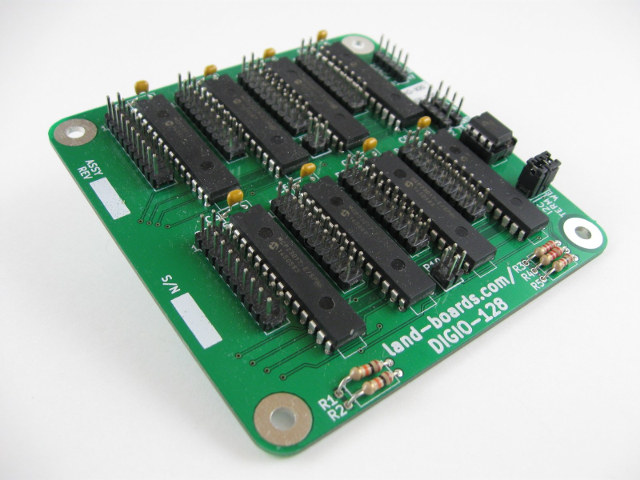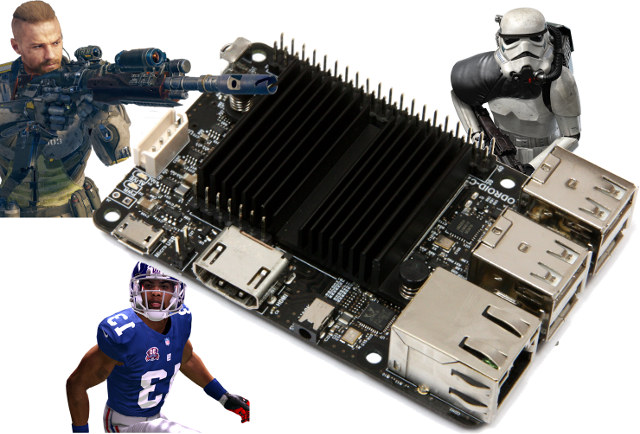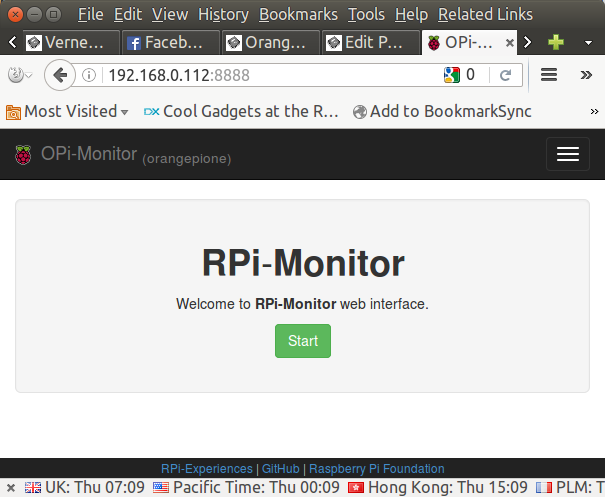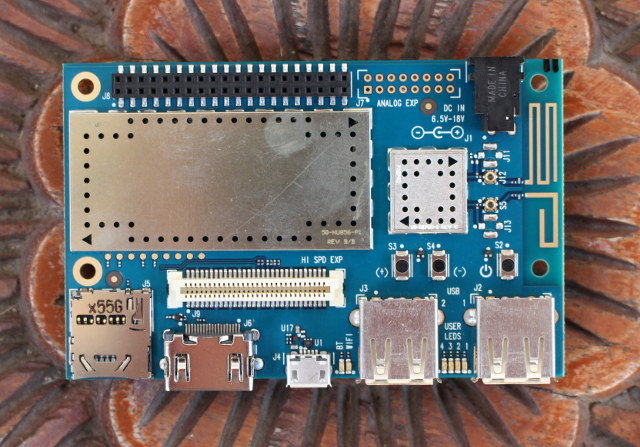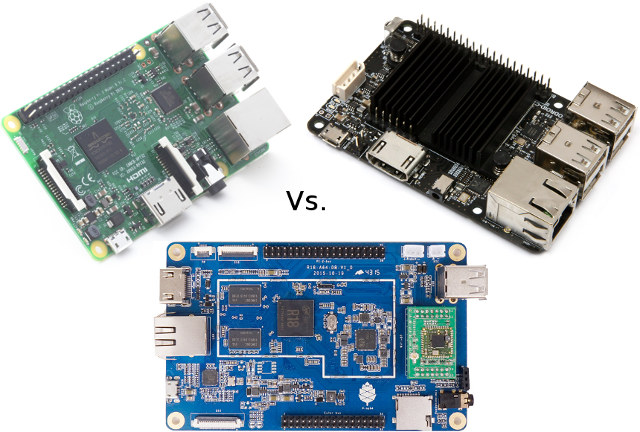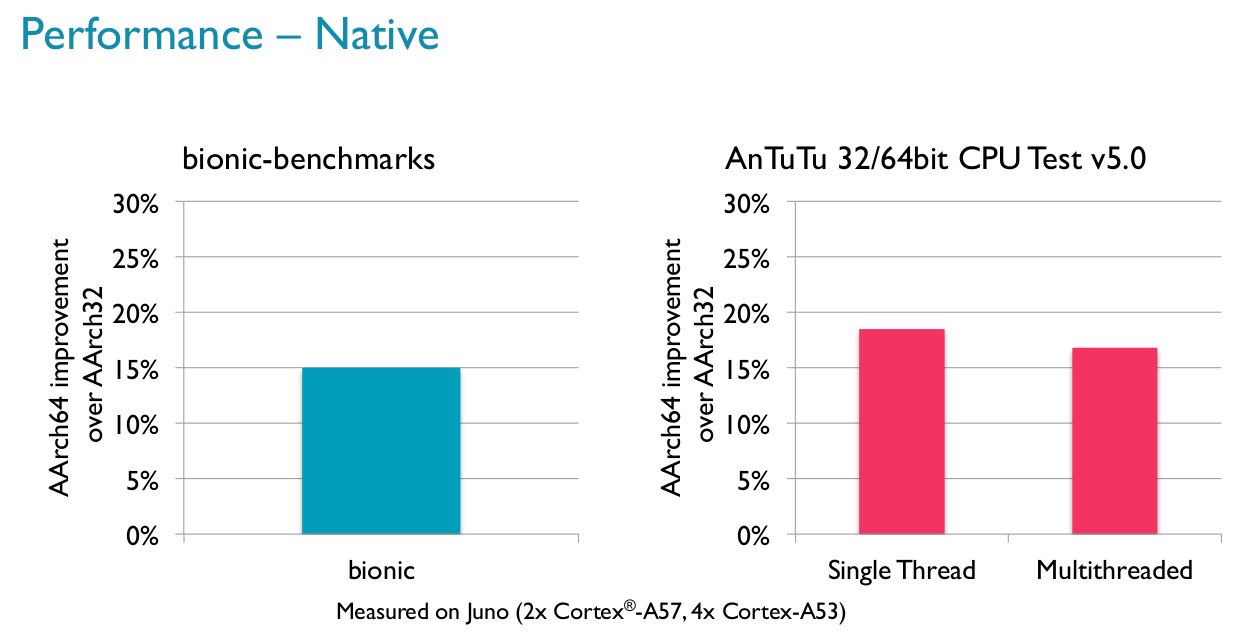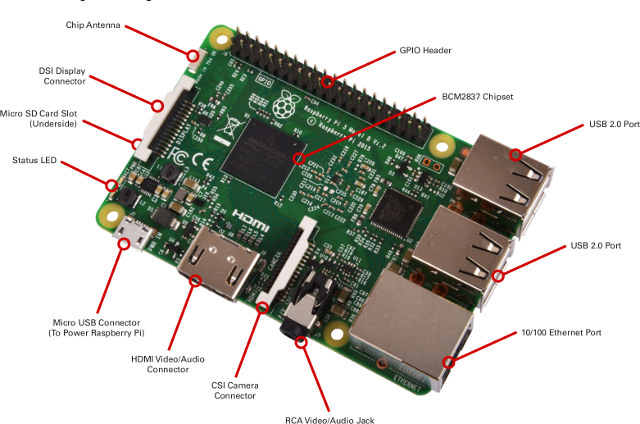If you run out of GPIOs on your board, the easy way is to add an I2C GPIO expander, but those are normally limited to 8 or 16-channels, so Land Boards decided to create a board with 8 IO expanders making it a 128 channel IO expander that works on Raspberry Pi, BeagleBone Black, Arduino, and basically any boards with an I2C hardware or software implementation. DIGIO-128 board specifications: 8x Microchip MCP23017 16-bit I/O expander for up to 128 GPIOs Communication Interface – I2C host interface with 100/400 KHZ operation; 4-pin host interface connector (Ground, Power, Clock, Data) 8x 20-pin 2.54mm pitch connectors with 16 I/Os, 2x VCC, and 2 ground 2x 4-pin interrupt connectors Data Storage – Microchip 24LC024 2K EEPROM with board info. 3.3V or 5V operation Dimensions – 95 x 95 mm You can find out to use the board in the Wiki for code for Raspberry […]
Play High-end PC Games on ARM Linux Boards with Moonlight Embedded
Nvidia first showcased PC games streaming to Nvidia Project SHIELD Game Console at CES 2013, and since then Moonlight project has been created to provide an open source implementation compatible with Nvidia Gamestream, and supported on Linux, Mac OS and Windows PC, Android & iOS mobile devices, as well as Samsung VR kits. There’s also an implementation called Moonlight Embedded designed for ARM Linux platforms such as Raspberry Pi,ODROID, Cubox-i boards, and ODROID-C1 and ODROID-C2 boards even got support for H.265 streaming very recently allowing for better quality over H.265 at a given bit rate, and possibly 4K @ 60 Hz gaming on ODROID-C2 board. You’ll need a Windows gaming PC with an Nvidia GTX 600/700/900 series GPU, a wired connecting or a high-end 802.11 router or greater, and Nvidia Geforce Experience (GFE) installed on your PC. H.265 requires an Nvidia 900 series GPU such as Nvidia GTX960. Once this […]
RPi-Monitor is a Web-based Remote Monitoring Tool for ARM Development Boards such as Raspberry Pi and Orange Pi
It can be pretty useful to monitor the CPU load, memory and storage usage, and network traffic of your boards, and they are already graphical tools like System Monitor on Ubuntu providing most of the information, and monit can be used on server, but I’ve recently been introduced to RPi-Monitor utility for Raspberry Pi and Orange Pi boards (patched version), that very easy to install, and provide neat chart of many different variables. Since I’m currently playing with Orange Pi One board running armbian, so that’s the platform I’ve used to run RPi-Monitor (OPi-Monitor). The usage should be exactly the same on Raspberry Pi, but the installation steps are little different. To install RPi-Monitor on Orange Pi One, open a terminal or access the serial console, and you can install and start the service with a single command line:
|
1 2 3 4 5 6 7 8 |
sudo armbianmonitor -r Installing RPi-Monitor. This can take up to 5 minutes. Be patient please .... Now patching RPi-Monitor to deal correctly with H3 Now you're able to enjoy RPi-Monitor at http://192.168.0.112:8888 |
It actually took around 8 minutes on my board, as […]
Linux 4.5 Released – Main Changes, ARM and MIPS Architectures
Linus Torvalds released Linux Kernel 4.5 on Sunday: So this is later on a Sunday than my usual schedule, because I just couldn’t make up my mind whether I should do another rc8 or not, and kept just waffling about it. In the end, I obviously decided not to,but it could have gone either way. We did have one nasty regression that got fixed yesterday, and the networking pull early in the week was larger than I would have wished for. But the block layer should be all good now, and David went through all his networking commits an extra time just to make me feel comfy about it, so in the end I didn’t see any point to making the release cycle any longer than usual. And on the whole, everything here is pretty small. The diffstat looks a bit larger for an xfs fix, because that fix has […]
Free and Discounted Development Boards: Raspberry Pi 3, DragonBoard 410c, LinkIt ONE and More
Based on the number of comments I get when I organize giveaways, I think people like freebies. I don’t have anything to give away today, but others have launched competitions to win free developments, and Seeed Studio is having a promotional event with some discount on IoT boards. DragonBoard 410c Boards “Maker Month Contest” Qualcomm has declared March as Maker Month, and is asking developer to tell them what they’d make with a DragonBoard 410c board for a chance to win the board and up to $5,000. All you have to do is to submit your idea on DragonBoardContest.com, and every week, the company will give 7 to 10 boards (31 boards in total) to the people with the best ideas as selected by popular vote. The contest has two part: Part 1 – Submit your idea as mentioned above – Open between March 1 and March 31, is open […]
Raspberry Pi 3, ODROID-C2 and Pine A64+ Development Boards Comparison
Raspberry Pi 3 and hardkernel ODROID-C2 launched the same day, and together with Pine A64/A64+, are the only ultra low cost (<$40) 64-bit ARM development boards available or soon-to-be available, so I’ve decided to make a comparison of the three boards the same way I did with ~$10 boards with a Raspberry Pi Zero, C.H.I.P, and Orange Pi One comparison. I’ve used features of Pine A64+ instead of Pine A64 since features and price are closer to the other two boards. Text highlighted in green means a board is clearly better than the other two for a given features, while a red highlight means it’s the weakest of the three. Raspberry Pi 3 ODROID-C2 Pine A64 Plus Processor Broadcom BCM2837 quad core Cortex A53 processor @ 1.2 GHz(4x ~2760 DMIPS) Amlogic S905 quad core Cortex A53 processor @ 2.0 GHz(4x ~4600 DMIPS) Allwinner A64 quad core Cortex A53 processor @ […]
64-bit ARM (Aarch64) Instructions Boost Performance by 15 to 30% Compared to 32-bit ARM (Aarch32) Instructions
Yesterday was quite an eventful day with the launch of two low cost 64-bit ARM development boards, namely Raspberry Pi 3 and ODROID-C2, and as usual there were some pretty interesting discussions related to the launch of the boards in the comments section. One of the subject that came is that while Raspberry Pi 3 board is using a 64-bit processor, the operating systems are still compiled with 32-bit instructions (Aarch32) and even optimized for ARMv6, and they intend to keep it that way according to Eben Upton interview: Eben readily admits that not all the capabilities of the new parts are going to be used at launch, however. “Although it is a 64‑bit core, we’re using it as just a faster 32-bit core,” he reveals about the Pi 3’s central processing unit. “I can imagine there’d be some real benefits [to 64-bit code]. The downside is that you do […]
Raspberry Pi 3 Board is Powered by Broadcom BCM2837 Cortex A53 Processor, Sells for $35
Raspberry Pi 3 board was first found on the FCC website, and thanks to various other leaks we had a pretty good idea of the board specifications including a Broadcom 64-bit ARM processor coupled with 1GB RAM, WiFi and Bluetooth, as well as basically the same features and ports as Raspberry Pi 2 Model B. But with the fourth anniversary of the Raspberry Pi Model 1 board, Raspberry Pi 3 has now officially been launched, and you can now purchase the board for $35. Raspberry Pi 3 specifications: SoC – Broadcom BCM2837 64bit ARMv8 quad core Cortex A53 processor @ 1.2GHz with dual core VideoCore IV GPU @ 400 MHz supporting OpenGL ES 2.0, hardware-accelerated OpenVG, and 1080p30 H.264 high-profile decode. Capable of 1Gpixel/s, 1.5Gtexel/s or 24GFLOPs with texture filtering and DMA infrastructure System Memory – 1GB LPDDR2 Storage – micro SD slot Video & Audio Output – HDMI 1.4 […]


